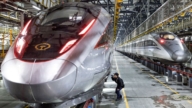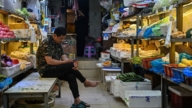【新唐人2012年7月9日訊】中共國家主席胡錦濤日前在北京舉行的「全國科技創新大會」上說,「到2020年,中國要進入創新型國家行列。」評論指出,胡錦濤的這番話,實際上反映了:以前靠加工和出口的中國經濟模式已經陷入死局,但要想學西方發達國家以技術創新來刺激經濟,在中國這個大的政治環境下不可能實現,因為創新需要自由,而中共政權要求老百姓像奴隸一樣對它唯唯諾諾的服從,評論認為,受控制的奴隸永遠不能創新。
除了胡錦濤期待中國未來走入創新型國家行列,中共總理溫家寶也在7月7號的會議上表示,「如果能在『中國製造』前面再加上『中國設計』,中國的經濟和產業格局就會發生根本性變化。」
但,中國大陸目前經濟處於艱難狀態,前期靠出口,靠附加價值的加工製造業模式,早已經失去優勢。
評論人士傑森分析說,創新所需要的民主法制社會環境和政治環境,在中國不存在,因此中國做不到經濟轉型。
評論員傑森:「中國為甚麼長期做不到經濟轉型呢﹖他主要是中國這個社會環境造成的,比如,中國對知識產權的淡漠,在中國真的做研發的企業是很倒黴的,因為你研發出來的東西很快就被山寨了,被模仿了。而且本身社會的發展方向全部都是官員決定社會發展方向,官本位的運作方式也造成了中國的創新實際上也是被中國的政治大環境所壓抑。」
中國問題研究人士何岸泉也認為,中共六十多年來一黨專政的政治制度和教育模式,壓抑了每個社會個體發揮他們的聰明才智。他說,中國「要進入創新國家行列」的目標不可能實現,只能算是一種政治宣傳。
中國問題研究人士何岸泉:「從六年小學,中學,大學我們受到的是甚麼樣的教育,是壓抑式的教育,規定的對標準答案的教育,他們這種教育模式實際上是讓一個人變成一個機器上的螺絲釘,這是毛澤東時代,現在的教育同樣是沿襲了以前毛澤東時代的教育,讓你背標準答案,抹殺你個人的創造發揮,發出同樣一個聲音。」
據了解,中國大陸,很多大學教授早已經放棄了沒錢可圖的科研,他們更多關注的是如何上馬一些短期的,立刻能拿到錢的項目。一些「海龜」派技術精英也在國內受到壓抑而無法施展才華。2009年9月17號,浙江大學「海龜」博士塗序新跳樓自殺,他在遺書中表示後悔回國,並寫道:國內學術圈的現實:殘酷、無信、無情。卻因他的自以為是而忽視。
何岸泉:「因為這個國家是權力關係,處處充滿權力,一個科研人員你必須花大把時間去拉攏上級,去經營關係,而不是經營科研,在這種情況下不可能出來科研結果。這個環境是權力遊戲,是拉幫結派的社會。」
何岸泉進一步分析說,中共政權要求老百姓像奴隸一樣對它唯唯諾諾的服從,又希望老百姓有非常強的獨立思考能力,有打破常規的創新能力,這是不可能出現的。傑森也指出,奴隸是永遠不能創新的,因為奴隸的思維是被控制的。
採訪/李倩倩 編輯/許旻 後製/蕭宇
Critics: Slaves No Way to Create an Innovative China
At the National Science & Technology Innovation
Conference, the Chinese Communist Party President Hu said,
“China aims to be ranked as one of the innovative
countries by 2020."
Commentators say, Hu’s talk showed that China’s economy,
which in the past heavily relied on the export of processing, has gone dead in the water.
While Western style technological innovation is not
likely to be realized in China under the CCP’s political system.
This is because freedom is a must for carrying out
innovation.
In contrast, the regime requires that people
be like obedient slaves.
While slaves under control can never be innovative,
said critics.
Hu Jintao’s expectation was also reflected by the CCP’s
premier Wen Jiabao, who said at a meeting held on July 7,
“If the 『made-in-China』 products can be prefixed with
『designed in China』,
the shape of the Chinese economy and industry
will change fundamentally.”
However in reality, mainland China’s economy is
undergoing hard times.
The export of material and export of processing industry
have lost their competitive edge already.
Critic Jason Ma points out that China lacks a democratic
justice system and a political setting that are necessary to realizing innovation.
So economic restructuring will not
happen in China, he says.
Jason Ma: “Why has China been unable to restructure
its economy over the past years?
It was mainly caused by the domestic social environment.
For example, the ignorance of intellectual property rights.
In China, the enterprises that truly conduct R & D suffer
a lot, and replicas of your product will quickly be produced.
Where society is headed is decided by officialdom, so
China’s innovation is actually suppressed by its politics."
He Anquan, scholar for China studies, says that
over decades, the CCP’s one-party establishment and
educational system have prevented social units from using talent.
He thinks there is no way for China to truly realize the goal,
『of being ranked as one of the innovative nations』, this is just propaganda.
He Anquan: “Since the 1960s during the Mao Zedong era,
all the education we received was a spiritually
oppressive education. It was an answer-standard education.
This actually turns a person into a machine screw.
It is the same case with today’s education in China.
Students are required to memorize standard answers,
and their creative potential is stifled."
Many university professors in China have reportedly
given up unprofitable scientific research,
but are turning to projects that can attract funds immediately
or in the short term.
Some overseas student elites were found to have been
prevented from using their talents after they returned to China.
A returned overseas Ph.D graduate Tu Xuxin,
jumped from a building in September 2009.
Tu felt regret at returning to China in his suicide note, saying,
“The reality of domestic academic circles: cruelty, no trust,
and heartlessness, but this has been ignored."
He Anquan: “Because this country is filled with power.
A researcher has to fawn on his superior, to establish
underlying connections, instead of doing research.
In this case, it’s impossible to make breakthroughs
in his researches.
The environment (in China) has become a society of
playing a power game and of cronyism."
He Anquan adds that the CCP requires slavish obedience
from the people,
but also wants them to have strong thinking and
capability for innovation, which is impossible.
Jason Ma also remarks that slaves can never be innovative,
this is because their thoughts are under control.




























